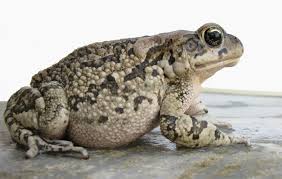中文词源
toad 蟾蜍
来自中古英语 tode,蟾蜍,来自古英语 tadie,蟾蜍,词源同 tadpole.
英语词源
- toad
-
toad: [OE] Toad is a mystery word, with no known relatives in any other Indo-European language. Of its derivatives, toady [19] is short for the earlier toad eater ‘sycophant’ [17]. This originated in the dubious selling methods of itinerant quack doctors. They employed an assistant who pretended to eat a toad (toads were thought to be poisonous), so that the quack could appear to effect a miraculous cure with his medicine.
The toad-eating assistant came to be a byword for ‘servility’ or ‘dependency’, and hence for ‘servile flattery’. Toadstools [14] were named for their stool-like shape, and also because of an association between poisonous fungi and the supposedly poisonous toad.
- toad (n.)
- c. 1300, from late Old English tadige, tadie, of unknown origin and according to OED with no known cognates outside English. Applied to loathsome persons from 1560s. Toad-strangler "heavy rain" is from 1919, U.S. Southern dialectal.
权威例句
- 1. He grabbed into the ooze and came up clutching a large toad.
- 他把手伸进淤泥里捞摸,结果抓上来一只巨大的蟾蜍。
- 2. His eyes seemed to bulge like those of a toad.
- 他的眼睛鼓得像癞蛤蟆。
- 3. Both the toad and frog are amphibian.
- 蟾蜍和青蛙都是两栖动物.
- 4. The toad had changed its colour to blend in with its new environment.
- 蟾蜍已经变色,和新的环境融为一体。
- 5. The Toad saw at once how wrongly and foolishly he had acted.
- 癞哈蟆现在意识到,他的所作所为实在太荒唐,太愚蠢了.

